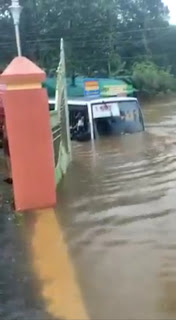- Get link
- X
- Other Apps
- Get link
- X
- Other Apps
Lesson from Kerala floods : Human activities, climate change has disastrous effects on environment
Sagaya Fernando
Mumbai: 19 October 2021
Overexploitation of natural resources and haphazard development by humans has led to climate change, resulting in long-lasting consequences on the environment. This is increasing health hazards and natural disasters, and more, day by day. The torrential flooding being witnessed recently in the state of Kerala in India is a prime example of this, say many experts.
This is not the first time that Kerala, a state of 34 million people, has been devastated by floods. It saw the worst floods in a century in 2018 when severe rains caused flash floods and landslides, killing nearly 500 people and leaving a million homeless. The following year, more than 125 people were killed in flash floods and landslides across the state. More than 50 were killed in August last year after landslides struck the hilly Munnar region.
The latest spell of torrential rains was caused by mini-cloudbursts exceeding 100 millimetre in one hour triggered by an unusual transformation of the cloud system over the Western Ghats on October 15, and has continued to lash the central parts of the state since then.
At least 27 people have been killed so far and several are missing in floods after heavy rains caused rivers to overflow, cutting off towns and villages. Kottayam and Idukki are two of the worst affected districts in the state, where days of heavy rainfall have caused deadly landslides.
Teams of emergency workers and the army recovered 27 bodies. The majority were from Kottayam and Idukki districts that received 164.5 mm and 305.5 mm rain respectively on October 16.
Thousands of people have been evacuated and 184 relief camps have been set up across the state. The armed forces along with the state disaster management teams are conducting rescue operations. Military helicopters are being used to fly in supplies and personnel to areas where people are trapped.
A major section of the state falls under the highly ecologically sensitive region of the Western Ghats, a mountain range extending through India’s west coast, and one the world’s largest biodiversity hotspots. In 2011, the Western Ghats Ecology Expert Panel, also known as the Gadgil Commission after its chairman Madhav Gadgil, an environmental research commission appointed by the Union Ministry of Environment and Forests had recommended that all of the Western Ghats be declared a sensitive region and “almost all developmental activities such as mining, thermal and power plants halted in it.” But development such as roads, buildings and rock quarries in sensitive areas of the state has led to such increasing natural disasters, say environmentalists.
- Get link
- X
- Other Apps







Comments
Post a Comment